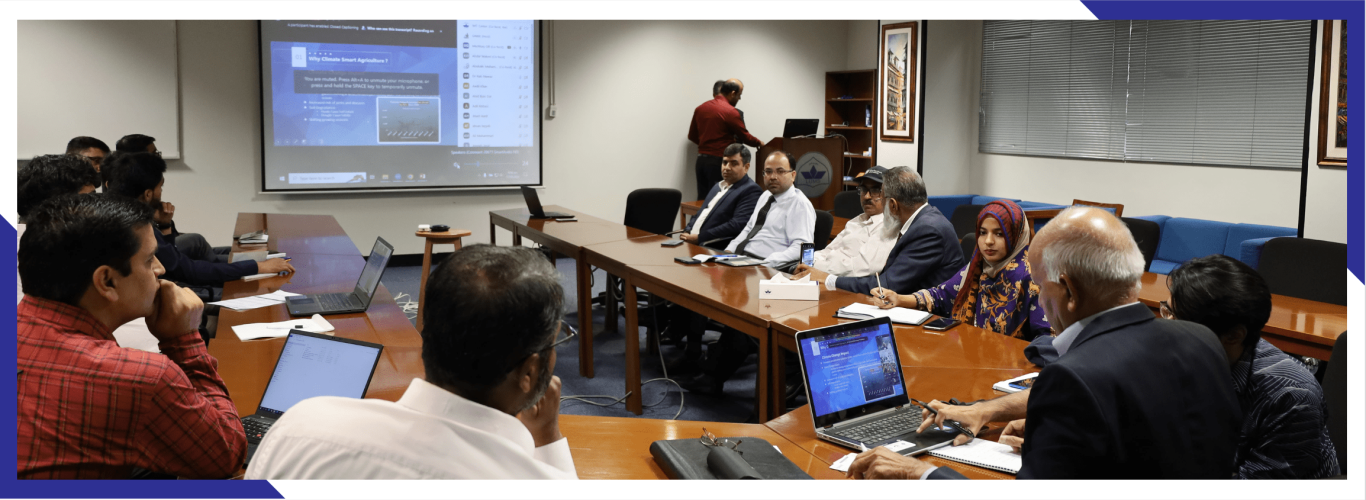WIT hosts UPSIGN and SAWiE’s Climate Smart Agriculture webinar
The UK Pakistan Science and Innovation Global Network (UPSIGN) collaborated with Sustainable Agriculture, Water and Intelligent Ecosystems (SAWiE) to organize a webinar on "Climate Smart Agriculture." The event was hosted by the Centre for Water Informatics and Technology at the School of Science and Engineering (LUMS). It brought together a diverse group of researchers and experts of the field from esteemed UK and Pakistani universities including WIT (LUMS), Aston University Birmingham, University of Mirpur, Bahauddin Zakria University Multan, along with industry representatives from Effitech, e-works and SAWiE.
The webinar focused on several aspects of climate smart agriculture, the advancements in research and methods to make these practices readily available to the farming communities in Pakistan. Dr. Abubakr Muhammad, Executive Director of WIT, shed light on the Centre’s work within this realm. He discussed projects on strategic planning for the water-energy-food (WEF) climate nexus in the Indus Basin, integrating digital Agri-Tech solutions with regenerative agriculture, and conducting a climate technology market assessment in 2022-the first of its kind in Pakistan. Dr. Zaigham Shahzad from LUMS focused on the genetics of regenerative agriculture and strategies to increase crop yields in the face of climate change. He backed his ideas by discussing wheat adaptation to regenerative farming which has already shown promising results and highlighted the potential of conservative agricultural practices in minimizing soil impact over time. The webinar also featured Dr. Khalid Mehmood, the founder of SAWiE, who emphasized the urgent need to introduce climate smart agriculture and raise awareness about increasing climatic effects, such as rising temperatures and water scarcity which can endanger crop health. The CEO of SAWiE, Mushtaq Ahmed Gill, talked about the challenges faced in promoting climate smart agricultural practices and put forth ideas to increase outreach into farming communities through establishing partnerships with academia and industry.

Researchers from other institutions also took the stage to share their valuable perspectives and ongoing projects. Dr. Muhammad Imran from Aston University gave insights into his UKRI funded project which focuses on the development of a hybrid energy-powered smart irrigation system. Dr. Aqsa Shabbir, Associate Professor at LCWU, shared her research on developing methods to quantify the effects of climate change on agriculture, including vegetation loss due to forest fires using satellite imagery. Her latest project on solar radiation modification, an intervention technique to lower temperture by reflecting solar radiation, is promising in tackling the effects of global warming on crop health. Ideas on making fertilizers more cost effective and environmentally friendly by reducing nitrogen losses were put forward by Dr. Abdul Waqeel, an associate professor at the University of Agriculture, Faisalabad. Representatives from other organizations, such as Sadeed Malik, CEO of Karachi Council on Foreign Relations, also participated by highlighting the improvements brought about by the utilization of drip irrigation among the farming communities and Dr Rab Nawaz, director planning for water management department Khyber Pakhtunkhwa (KP) discussed how farming communities in KP were adopting climate smart agricultural practices.

The webinar served as a dynamic platform where experts and researchers from various fields collaborated to address the challenges posed by climate change in the agricultural sector. The presentations and discussions showcased innovative projects, research endeavors, and practical solutions that hold immense potential for sustainable and climate-resilient farming practices. Such events play a vital role in fostering knowledge exchange, promoting interdisciplinary collaboration, and ultimately driving the transformation towards a climate-smart and resilient agricultural landscape for Pakistan.





